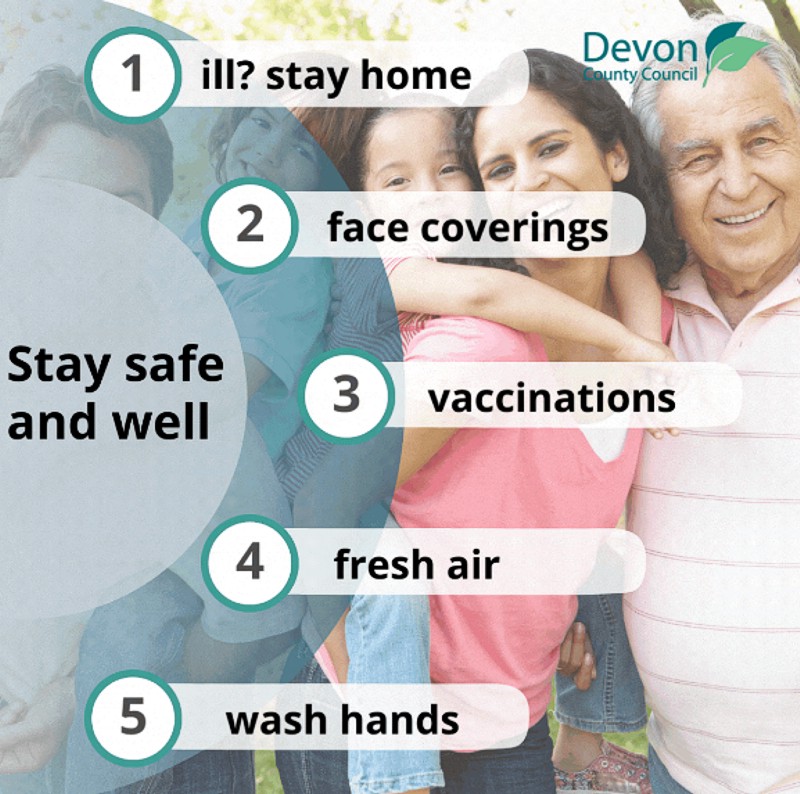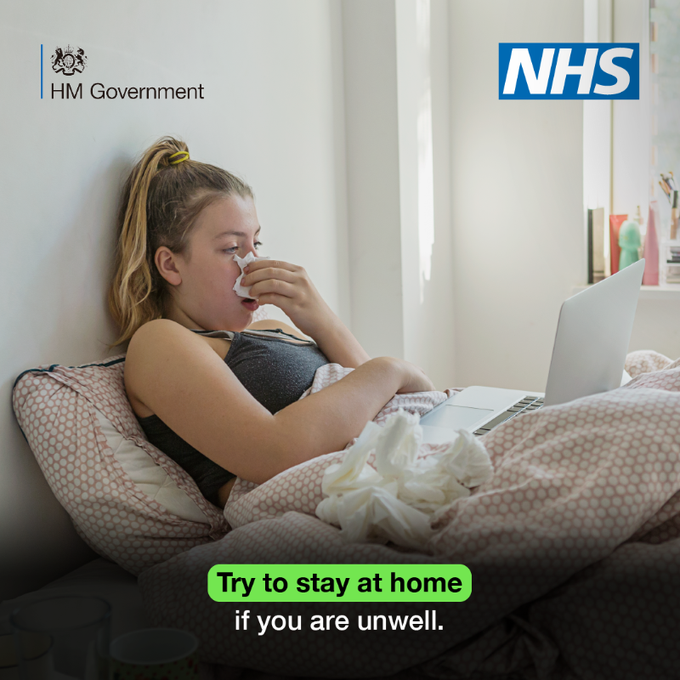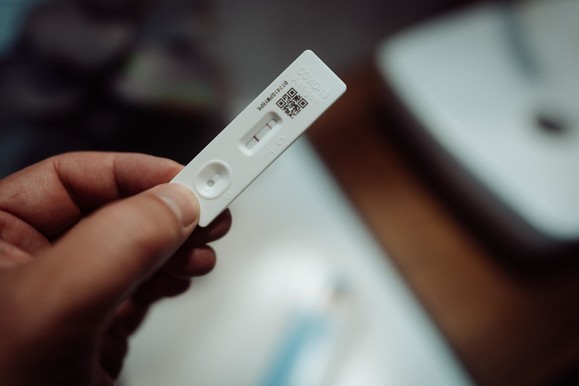As April started, so did a new phase of living with COVID-19, where the virus will be managed like other respiratory illnesses.
But the pandemic is not over, and how COVID-19 will develop over time remains uncertain, so we all still have a part to play in helping keep ourselves and each other safe and protected.
The government has published important advice for people with symptoms of respiratory infections, such as COVID-19; people with a positive COVID-19 test result and their contacts; and advice on safer behaviours for everyone.
It sounds like a lot to take in, so Devon County Council have produced this useful summary of the new advice.
Symptoms of respiratory infections, including COVID-19
Respiratory infections can spread easily between people, so it’s important to be aware of the symptoms so you can take action to reduce the risk of spreading your infection to others.
Symptoms of COVID-19, flu and common respiratory infections include:
- continuous cough
- high temperature, fever or chills
- loss of, or change in, your normal sense of taste or smell
- shortness of breath
- unexplained tiredness, lack of energy
- muscle aches or pains that are not due to exercise
- not wanting to eat or not feeling hungry
- headache that is unusual or longer lasting than usual
- sore throat, stuffy or runny nose
- diarrhoea, feeling sick or being sick
People who are at higher risk from COVID-19 and other respiratory infections include:
- older people
- those who are pregnant
- those who are unvaccinated
- people of any age whose immune system means they are at higher risk of serious illness
- people of any age with certain long-term conditions
Please remember that you will not always know whether someone you come into contact with outside your home is at higher risk of becoming seriously unwell from a respiratory infection. They could be strangers (for example, people you sit next to on public transport) or people you may have regular contact with (for example, friends and work colleagues).
This means it is important to follow the guidance to reduce the spread of infection and help to keep others safe.

How do I reduce the risks of spreading respiratory infections?
As we learn to live safely with COVID-19, there are actions we can all take to help reduce the risk of catching the virus and passing it on to others. These actions will also help to reduce the spread of other respiratory infections, such as flu, which can spread easily and may cause serious illness in some people.
Getting vaccinated –
vaccines are the best defence we have against respiratory infections such as COVID-19 and flu. They provide good protection against hospitalisation and death as well as reducing the risk of long-term symptoms.
Let fresh air in if meeting others indoors –
the amount of respiratory virus in the air can build up in poorly ventilated areas, which increases the risk of spreading it. Bringing fresh air into a room by opening a door or a window, even for a few minutes at a time, helps remove older stale air that could contain virus particles and reduces the chance of spreading infections.
Remember the basics of good hygiene –
cover your nose and mouth with a tissue or the crook of your elbow when you cough and sneeze to reduce the distance your particles travel and the time they stay in the air; wash your hands properly and regularly so you remove viruses and other germs you may have picked up from contaminated surfaces; clean your surroundings frequently, particularly those touched at lot such as handles.
Wear a face covering –
this can reduce the number of particles that are released from the mouth and nose of someone who is infected with a respiratory virus and also protect the person wearing the face covering from becoming infected by some viruses. It’s a good idea to wear one when there are a lot of respiratory viruses circulating, such as in winter, and especially if you are in crowded enclosed spaces or are in contact with someone at higher risk of becoming seriously unwell from respiratory infections.
Try to stay at home and avoid contact with other people when unwell –
if you have symptoms of a respiratory infection and you have a high temperature or do not feel well enough to go to work or carry out normal activities, try to stay at home and avoid contact with other people, until you no longer have a high temperature or until you no longer feel unwell.

What should I do if I have symptoms of a respiratory infection?
People with symptoms of a respiratory infection, such as COVID-19, and who have a high temperature or do not feel well, should try to stay at home and avoid contact with others.
Anyone who needs to leave their home whilst they have symptoms of a respiratory infection should take important precautions to minimise the chance of passing on their infection, such as:
- wearing a well-fitting face covering or a face mask
- avoiding crowded or enclosed spaces such as public transport, large social gatherings and enclosed or poorly ventilated spaces
- exercising outdoors and away from others
- covering your mouth and nose when you cough or sneeze; washing your hands properly and frequently with soap and water for 20 seconds or use hand sanitiser after coughing, sneezing and blowing your nose and before you eat or handle food; avoid touching your face.
What should I do if my child has symptoms of a respiratory infection?
Respiratory infections are common in children and young people, particularly during the winter months. Symptoms can be caused by several respiratory infections including the common cold, COVID-19 and respiratory syncytial virus (RSV) and for most children and young people, these illnesses will not be serious, and they will soon recover following rest and plenty of fluids.
Attending education is hugely important for children and young people’s health and their future. Children and young people with mild symptoms such as a runny nose, sore throat, or slight cough, who are otherwise well, can continue to attend their education setting.
Children and young people who are unwell and have a high temperature should stay at home and avoid contact with other people, where they can. They can go back to school, college or childcare, and resume normal activities when they no longer have a high temperature and they are well enough to attend.
All children and young people with respiratory symptoms should be encouraged to cover their mouth and nose with a disposable tissue when coughing and/or sneezing and to wash their hands after using or disposing of tissues.
It can be difficult to know when to seek help if your child is unwell. If you are worried about your child, especially if they are aged under 2 years old, then you should seek medical help via your GP or NHS 111. In an emergency call 999.

What to do if you have a positive COVID-19 test result
Those who are asked to, or choose to, take a COVID-19 test, and get a positive result should try to stay at home and avoid contact with other people for five days after the day of the test. If you leave your home during this time, following steps above will reduce the chance of passing on COVID-19 to others.
You should also advise anyone that needs to come into your home that you have a positive COVID-19 test result, so they can take precautions to protect themselves such as wearing a well-fitting face covering and keeping their distance if they can.
It is particularly important to avoid contact with anyone who is at higher risk of becoming severely unwell if they are infected with COVID-19, especially those whose immune system means they are at higher risk of serious illness from COVID-19, despite vaccination, for a 10-day period.
It is no longer a requirement for children and young people to test for COVID-19 unless directed to by a health professional. Children and young people tend to be infectious to other people for less time than adults, so if they have a positive COVID-19 test result they should try to stay at home and avoid contact with other people for 3 days after the day they took the test, if they can. After 3 days, if they feel well and do not have a high temperature, the risk of passing the infection on to others is much lower.
While you are infectious there is a high risk of passing your infection to others in your household, so try to limit your close contact with the people you live with, keep your distance and wear a face covering in communal areas, ventilate rooms and regularly clean frequently touched surfaces.
What to do if you are a close contact of someone who has had a positive COVID-19 test result
People who live in the same household as someone with COVID-19, or who stayed overnight, are at the highest risk of becoming infected because they are most likely to have prolonged close contact.
If you are a household or overnight contact of someone who has had a positive COVID -19 test result it can take up to 10 days for your infection to develop, and it is possible to pass on COVID-19 to others, even if you have no symptoms.
During this time you can reduce the risk to others by limiting your close contact with them, wearing a face covering and washing your hand properly and frequently. It is also important to avoid contact with anyone you know who is at higher risk of becoming severely unwell if they are infected with COVID-19, especially those whose immune system means they are at higher risk of serious illness from COVID-19, despite vaccination.
If you develop symptoms of a respiratory infection try to stay at home and avoid contact with other people and follow the guidance for people with symptoms of a respiratory infection.
Children and young people who usually go to school, college or childcare and who live with someone who has a positive COVID-19 test result should continue to attend as normal.
